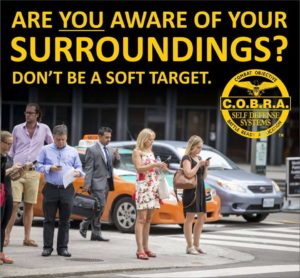

C.O.B.R.A. Self-Defense Training Programs
All of our self-defense programs are taught by Certified C.O.B.R.A. Instructors.
These programs include:
Adult Training Programs
1 day Self Defense Survival Camps
Active Shooter/Assailant & Campus Intruder Response Plan (ASRP) training
Real Estate Safety Training
5 and 10- week C.O.B.R.A. Self Defense Academy
Teen and Children Programs
Self Defense for Teens and Young Adults
Child Abduction Prevention (CAP) workshop
Children Self-Defense, Anti-Bully Response Programs
Active Shooter/Assailant & Campus Intruder Response Plan ASRP training
Business Organization and Corporate Programs
We provide personalized programs for any size business, corporation, or organization. These programs will provide great team-building opportunities and attendees will learn personal safety/self-defense strategies that can be incorporated into everyday life.
Custom Training for Individuals and Groups
We provide personalized training for individuals or groups of any size. Examples include Girls Night Out, Safety training for Running Groups, etc. For more information, contact us.
All techniques are from the C.O.B.R.A. self-defense academy curriculum, have proven effective techniques and strategies for individuals of all ages and physical abilities.
Free Power Demo Registration Form

This Powerful Self-Defense Demo will discuss the following: How to de-escalate a potentially deadly encounter. Learn what criminals want and how they think. Learn the secret formula that gives criminals the advantage. How to look like a hard target rather than a soft target. Learn about self-defense myths: what works, what doesn’t, and why. How to prevent the abduction of children and adults. How to deal with a bully. How to strike with deadly force no matter your size. The common myths of self-defense. Why this critical skill set is so important to learn. Understanding criminal intent. How to quickly determine what the criminal really wants and why this is crucial. |

How long does it take to learn Self-Defense?
That depends on where you train. If you enroll in a martial arts school, your goals and objectives are not that of a real-world self-defense program. That’s because martial arts schools have lots of traditional requirements, sports skills, techniques, and forms that are not self-defense-oriented. In contrast, COBRA only teaches self-defense, so you can streamline your training in an hour of COBRA, a 5 or 10-week academy, or any of our formats. This is a more effective and efficient way to train.
Will you come out to my group for free?
Will you come out to my group for free? Yes. We do this all the time. It’s called a Power Demo and we can customize it for your group. This will give everyone a clearer idea of what COBRA Self Defense offers. This is a real class and demonstration that provides tremendous value. It’s an informative and comprehensive overview of COBRA Self Defense. This can be customized for children, teens, adults, groups, organizations, and corporations, large and small.
Do I need to be in good shape or have any experience?
No. you do not have to be fit or have any previous experience. COBRA Self-Defense only requires that you have a desire to learn.
Why not just carry a gun?
The 3 most valuable firearm skills are the ability to access, deploy, and retain your weapon. Weapon retention is the most important of the 3. Most people do not train for this. Even a highly trained professional, like a policeman, who works with a gun every day, is at risk of losing their weapon to a criminal. Killing paper at the range is easy, being in a live shooting situation is completely different and we demonstrate this in your first COBRA class.
I want to enroll my children but I carry a gun, so I don’t need COBRA.
People actually say this to us more times than you can imagine. See the question above and/or attend one of our classes to see why this belief is dangerously flawed.
Why take a COBRA Self Defense class?
Because training saves lives. The two descriptions most posted in Google and Facebook reviews are, “Life-Changing” and “Eye Opening.”
Is COBRA Self-Defense a martial art like Karate or Tae Kwon Do?
COBRA Self Defense is NOT a martial art. The martial arts tend to approach training with the goal of teaching a long-term, complex system. On the other hand, COBRA prepares students to be able to handle multiple types of real-world criminal encounters. It’s not a sport, game, competition, or traditional martial art. While that can be valuable training, it leaves little time and focuses on realistic self-defense.COBRA Self-Defense is 100% realistic Law Enforcement-based self-defense. There is no bowing, belts, or ritual. Just learning.
When picking a Self-Defense program choose Quality and Professionalism over everything else.
If you were going to jump out of an airplane, would you want the free parachute or the top of the line? While we would never discourage you from learning, generally you get what you pay for. As certified COBRA Self Defense instructors, we are professionals. This is what we do and have done since 2002.
What is COBRA Self Defense?
The COBRA system is truly one of a kind. COBRA uses a variety of teaching formats to help students learn self-defense fast. Our law enforcement skill sets are the same as taught in the Police Academy, so you know that they are tried and true.
How do I assess a Self Defense Program?
The average person spends very little time in their life reviewing self-defense or martial arts programs. You may buy into a program that has no basis in real-world self-defense because “you don’t know what you don’t know”. Here are 3 red flags that a program may not be reality-based.
1 They do pre-rehearsed self-defense demos. For instance, they’ll have a woman being attacked and as she kicks and punches the attackers, they drop like flies all around her. COBRA Self-Defense never does pre-rehearsed demos. We will pull someone from the audience who we may have never met to help illustrate the reality of the point we’re trying to make.
2 They demonstrate a child kicking and punching an adult male until he drops, defeated. This will never happen. Kids can’t fight their way out of the grasp of a determined adult criminal the way most people think.
3 The demonstrating attacker holds his or her punch out and stands still while the defense is being executed. In martial arts, this is called “One Step Sparring” and it is often passed off as self-defense. It is not.
How do I assess a Self Defense Program?
How is COBRA Self Defense different than Krav Maga? COBRA was developed from real-life Law Enforcement training and field experience. COBRA Self Defense was created in 2002 by Chris Sutton. He literally created the system in his squad car between calls while simultaneously working as a full-time Law Enforcement Officer and martial arts school owner.
COBRA Self Defense and Krav Maga are viewed by many as the top of the list, which is why this question comes up so often. Either one can serve you well provided the instructors are highly trained and qualified, but there are some differences. It’s helpful to understand that the words, “krav maga” translate to “contact combat” in Hebrew. So, any contact combat system can be described as Krav Maga.
Generally speaking, Krav Maga evolved from the 1950s as a system developed for the Israeli Defense Forces (IDF). There are distinctions between COBRA and Krav but for the average person, it boils down to this: Police officers physically engage criminals on a daily basis. This means what works and what doesn’t work gets filtered through in real-time. Law Enforcement agencies continually enhance their skills and training based on what is most effective in real-world situations against criminals of all types.
COBRA Self Defense continually upgrades and enhances its curriculum by attending and participating in Law Enforcement field training events and on-duty patrol activities. In contrast, a military soldier may never have a physical engagement, so the majority of what is learned is in the classroom, not the field of battle or the streets.